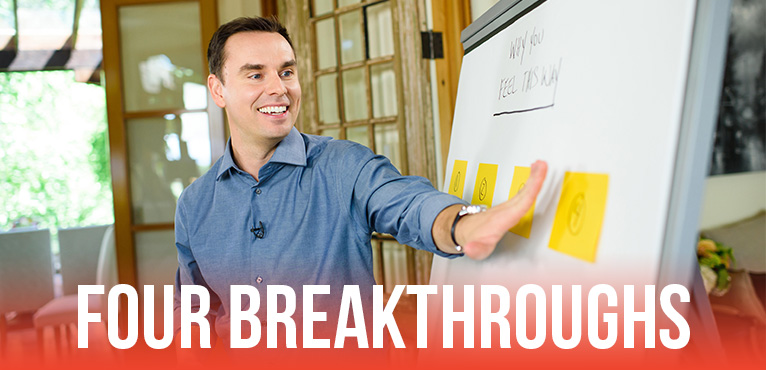SUMMARY
- “The way that you deal with every little bit of surprise, drama, and disappointment is only setting you up for how you’re going to deal with the next one.”
- How do you handle your worst days? It can be hard to stay positive when you’re having a tough time. Try these tips to maintain a positive mindset and build resilience—especially when you’re struggling.
- “If you can have that mindset that there’s nothing wrong with you being sad, you’ll be healthier. You have to allow sadness to happen. You can’t apologize for it, you can’t try to hide it. Sadness happens.”
- Bad days happen to all of us. It’s how you handle your negative emotions that determines your experience. Learn what a healthy response to your worst days looks like and how to stay positive during the challenges!
- Watch the video to get the full training.
- Already have the High Performance Planner and CRUSHING each and every day? Let’s celebrate you! Take a photo with your planner and use #HPXlife or #TeamHPX.
HOT NEWS & DEALS!
-
Free Trial for Reignite Your Life course!
Enjoy a free trial for my Reignite Your Life course where I help you break the pattern of negative thinking and bad habits so you can deeply reconnect with your purpose! Click here to gain access.
-
High Performance Planner!
This is the 2-in-1 planner and journal achievers use to win the day and accelerate long-term success. Get yours here (while supplies last)!
DID YOU KNOW?
I give weekly prizes, gratitude and shout-outs to our students, so post a screenshot or video on Instagram and use #TheBrendonShow! I can’t wait to hear your thoughts about this episode!
RELATED POSTS
How to Reprogram Your Mind for Positive Thinking
When You Feel Horrible (Tired, Bored, Sad)
Overcoming Doubt and Negative Beliefs to Achieve Your Dream
The Power of Presence and Positivity
How to Deal with Stressful Situations, Proactively!
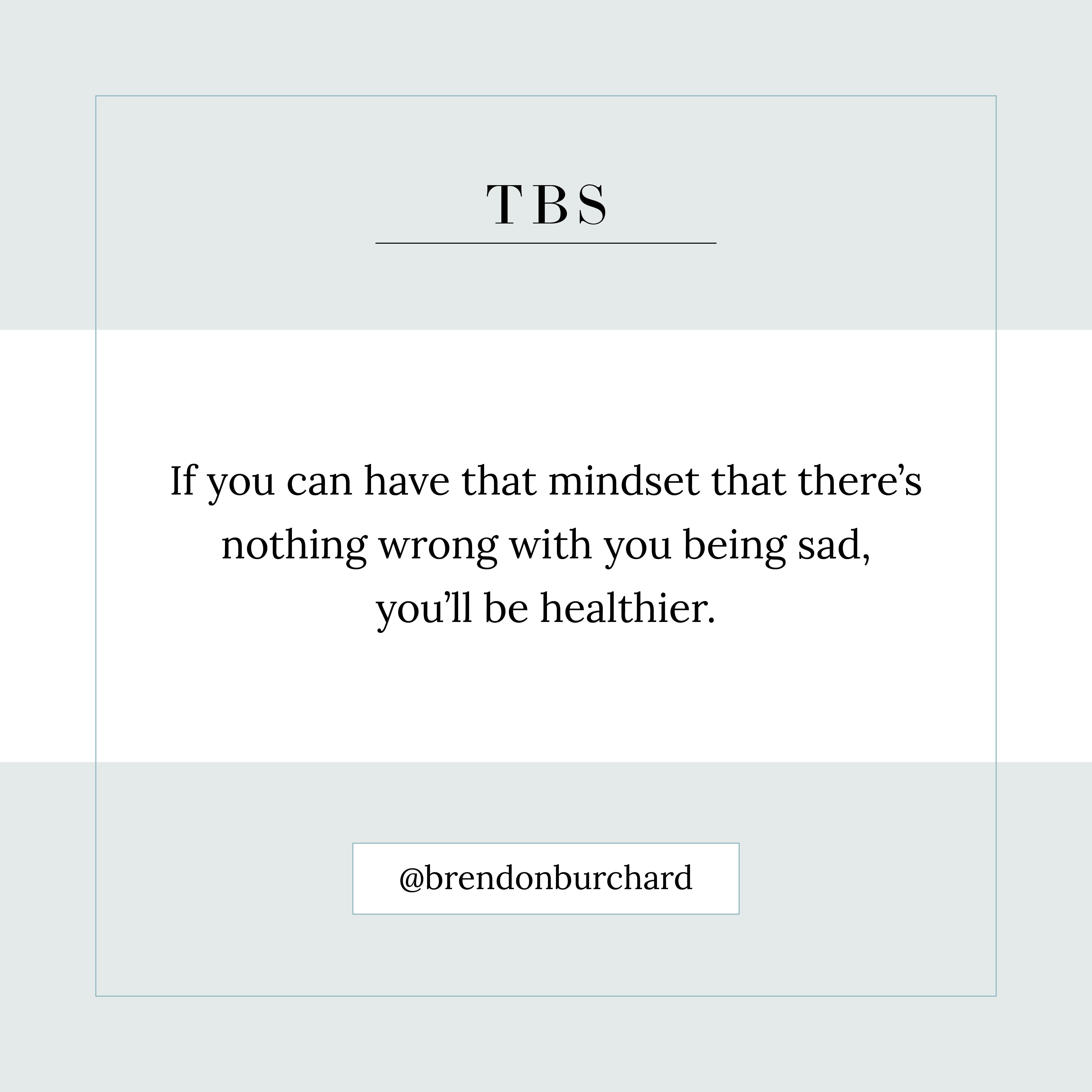
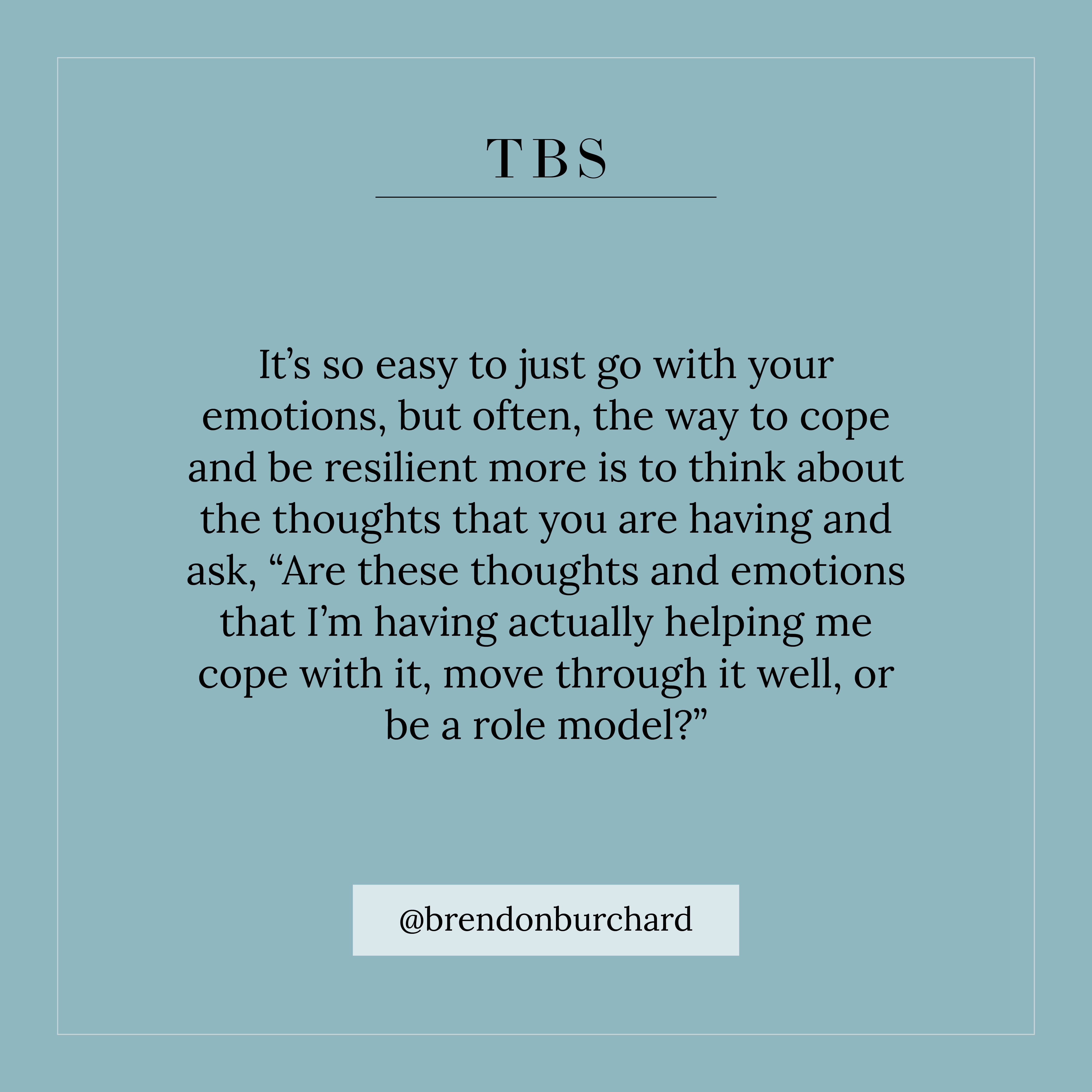
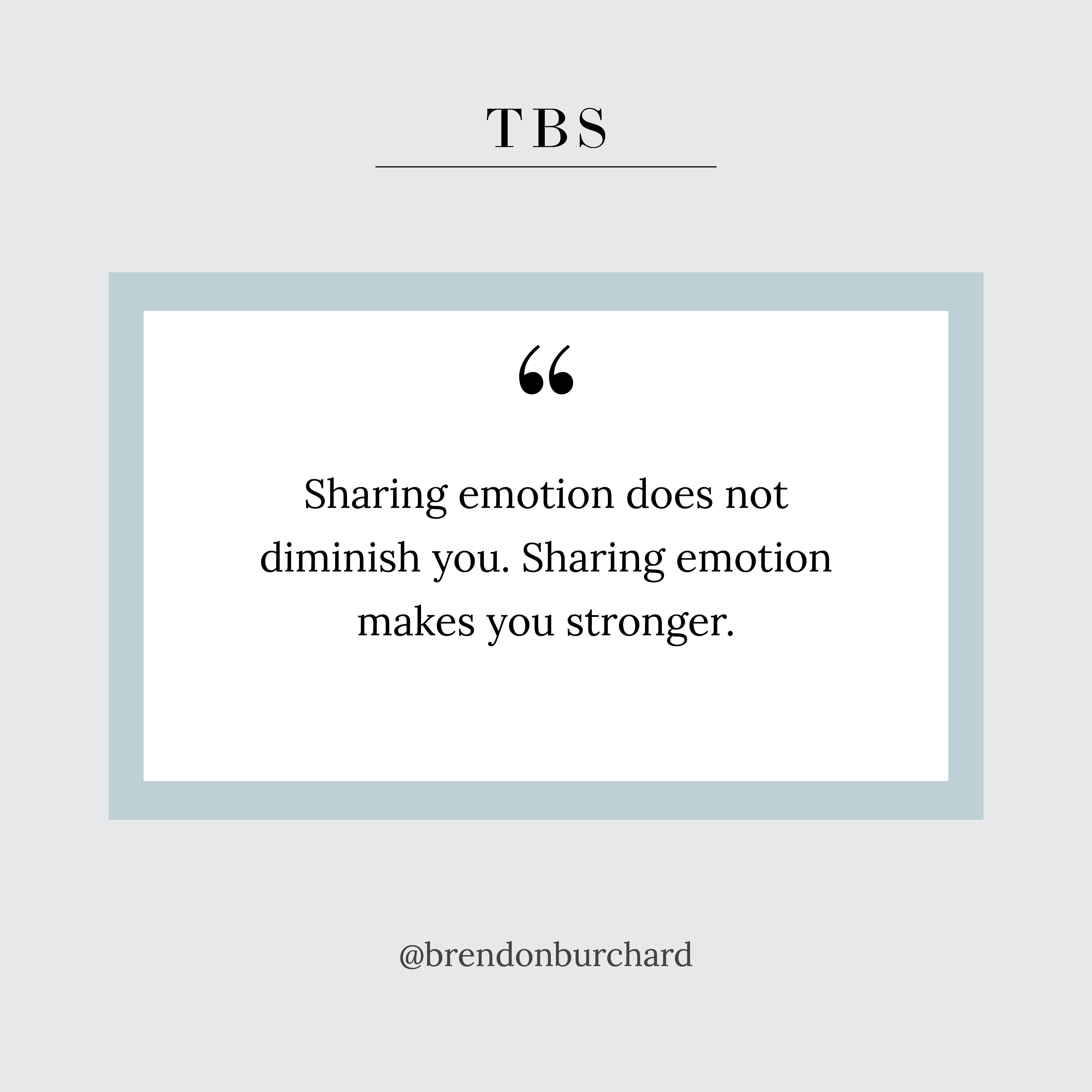
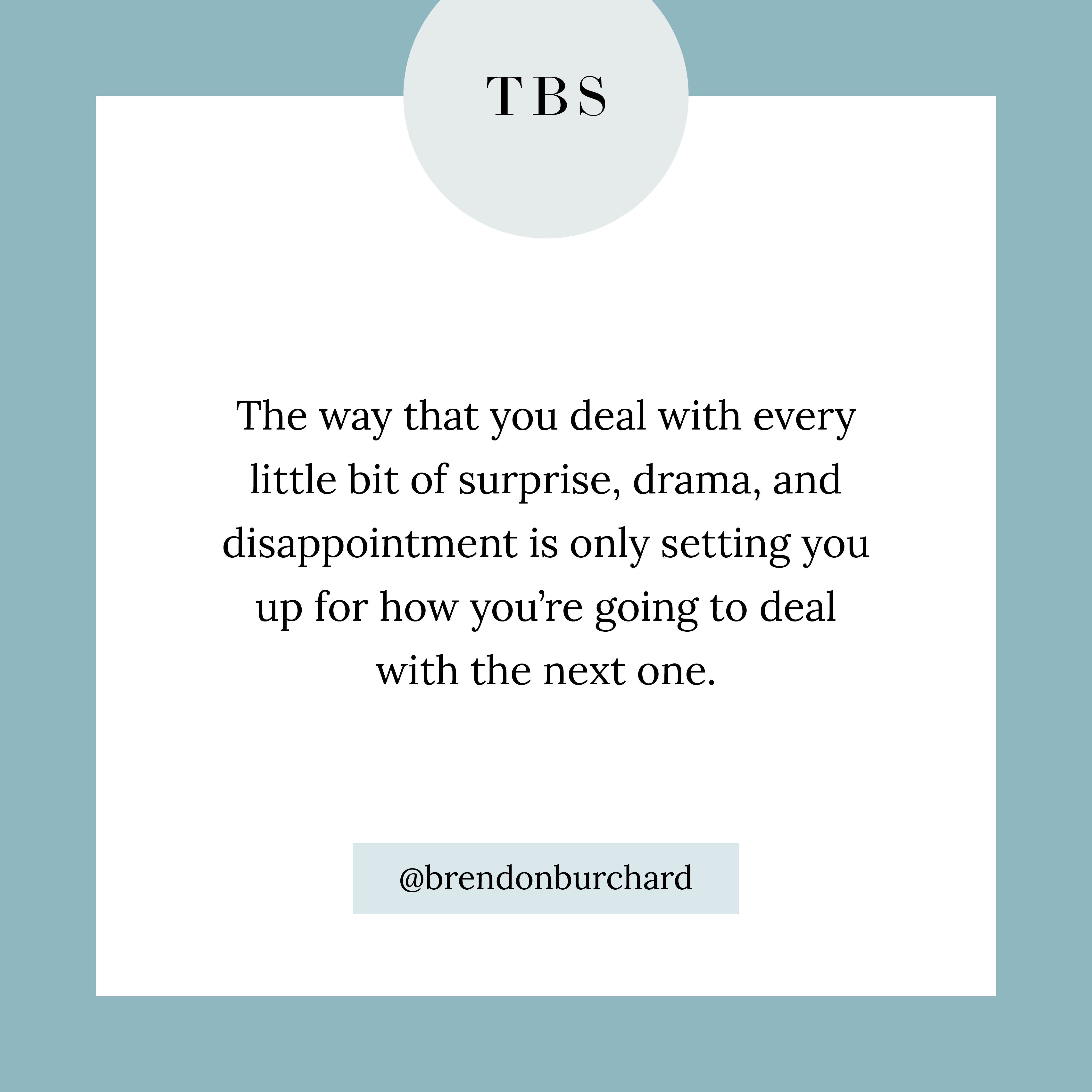
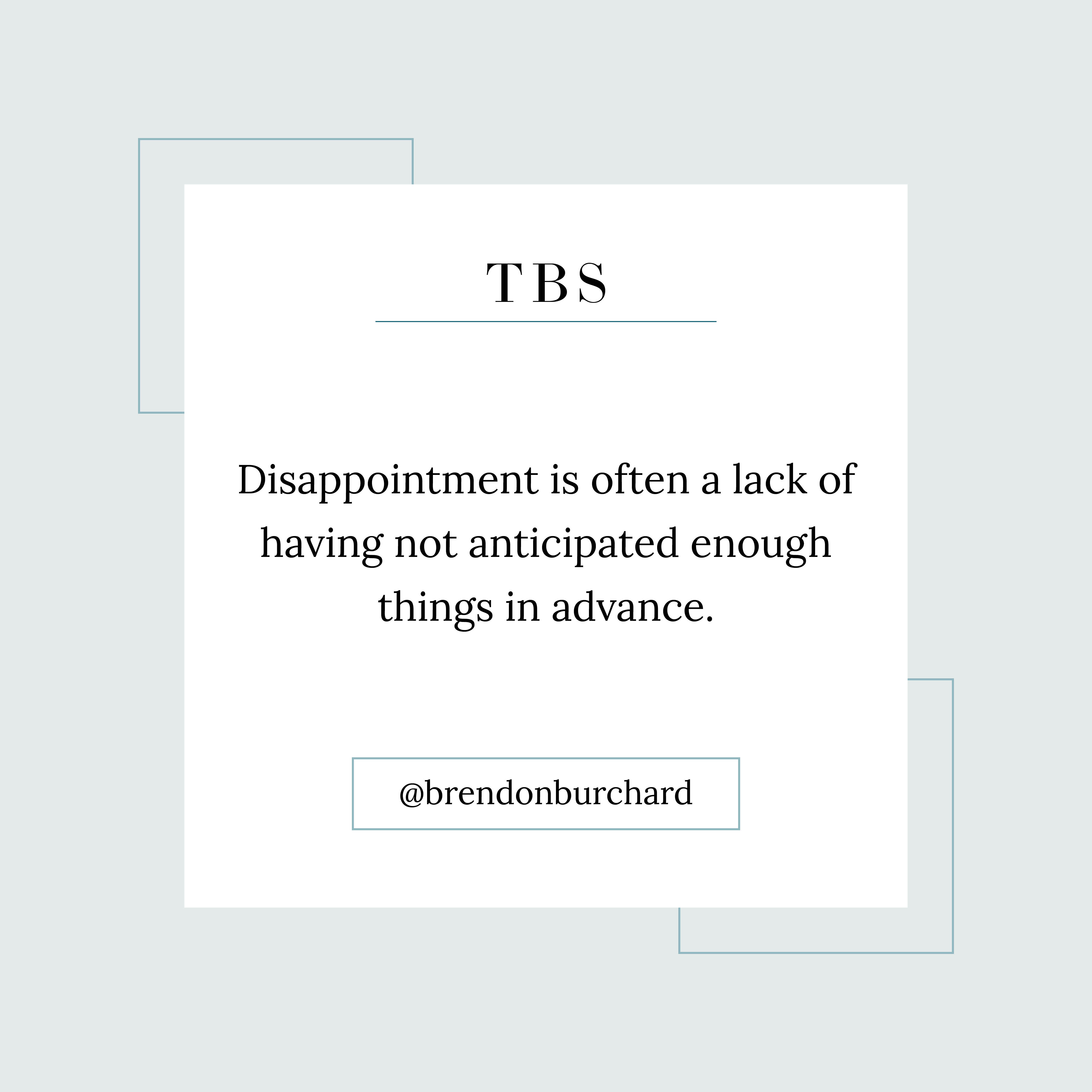
FULL TRANSCRIPT
[The following is the full transcript of this episode of The Brendon Show. Please note that this episode, like all TBS episodes, features Brendon speaking extemporaneously–he is unscripted and unedited. Filmed in one take, The Brendon Show has become one of the most viewed unscripted, direct-to-camera self-help series in the history of YouTube. It has also been the #1 Podcast in all of iTunes and is regularly in the top podcasts in Self-Help and Health categories around the globe. Subscribe to the free motivational podcast on iTunes or Stitcher.)
It’s tough to be your best right now. There are a lot of people who are complaining, there are a lot of people who are upset, there are a lot of people who—often out in the culture—are just thriving on that negativity and chaos, and it makes it hard for really positive, really progressive, really like—people who are excited to change the world and do their good works, it’s difficult and I know that. So you being a high performer and being here right now dedicating your life and working really hard to being your best and making great contributions to the world, it can be hard. I know that and that’s what this session is about this month.
We’re going to take on what it’s like when you have those dark days, those disappointments, those huge setbacks that happen inevitably to all of us and how you can use your mind and set up a few habits to overcome those a little faster, to cope with them in a responsible manner, but also, to feel alive again after those really dark days. That’s a big topic here we’re going to talk about. It’s not always the most inspiring thing when we talk about the difficult days but I do know that we all have to learn to be more resilient if we’re going to be high performers.
We have to learn how to transform all that negative, chaotic energy into something that we have a sense of control about and that we can create some positive outcomes toward the things that we want in our life. That’s hard when maybe your business is struggling or your spouse isn’t supportive or somebody in your family is sick or having really bad health or got a bad medical report. I know all of that’s hard. So, I’m here to cheer you on this week, but also give you some capabilities and maybe new ways to look at a few things and try a few new things that will get you out of those dark days a little faster.
1. Learn to Anticipate Drama
The first piece I want to really talk about is maybe something most people don’t think about and that is often, the dark days we have, the crushing defeats, the difficulties of life, often they’re not preventable—I mean, you can’t prevent all the medical reports when they’re bad, you can’t prevent every difficulty in the business. But here’s what I have found over and over: the people who keep getting knocked off their feet over and over who can’t get back to resilience or back to high performance often fail to do something very simple that turns out some of the world’s greatest leaders do. That’s a very simple thing, that is to learn to anticipate drama. Learn to anticipate drama or turmoil or difficulty or challenge.
Now again, I know we’ve got people from all walks of life here. We have some people who are dealing with some major issues. So let me give some examples here from minor issues to bigger issues.
Sometimes, let’s say you end up at the end of the day and you had that big meeting earlier in the day and it didn’t go the way you thought it did and you’re really disappointed about how it turned out.
Disappointment is often a lack of having not anticipated enough things in advance.
So, what ends up happening is, you kind of roll in with all these high expectations, but you didn’t anticipate the difficulties or the challenges that will come up, right? It turns out a lot of work done by Jim Collins and other organizational leaders have found out that leaders tend to anticipate drama in the sense that they’re a little bit paranoid. They’re not paranoid in a negative way or an obsessive way, but they’re so thoughtful about what might go wrong that they’re less disappointed later on.
So for example, if you had to go in that big important meeting of the day and you’re really excited about this meeting, you’re finally going to be vulnerable and share your ideas and be excited about your new dream, your new idea, and you plan out everything you’re going to say and you plan out how to do the close and you think through everything and you practice everything, but then in the middle of that meeting, someone goes, ”I think that’s a stupid idea,” and you didn’t anticipate that drama, you didn’t anticipate that someone’s going to doubt you, someone is going to object, someone is going to interrupt you. If you don’t anticipate those things, they really throw you off and they rattle you so much that later on, you’re a hot mess about it.
Later on, you’re like, “Oh my God, I didn’t think that person was going to say this and that.” Everything in life—if you’re going to be a high performer—you might take a step back and say, “What’s going to trip me up about this?” Many of you know that I do that every single morning in the shower. So the second question I ask in the shower is always, “What might trip me up today or throw me off and how would my highest self meet that?” I ask that every single day. When I look at my calendar, I see big events come up, I go, “Okay, what might go sideways there, what might not work out well?” And by anticipating that, when it comes up, I’m calm, I already saw it in my mind, I already knew it might happen, I already anticipated what to do.
But I mean this also at a more difficult level of life, right, that sometimes there’s going to be some major, major turmoil in life and let’s say you’re heading into a breakup of a relationship. So many people go into the breakup of a relationship and they don’t think it through and so, they don’t anticipate that, of course, the other person’s going to fight for what they want. Of course, the other person is going to become selfish at some point. Of course, the other person is going to become scared at some point. Of course, the other person is going to argue and blame.
But when those things happen, people are so surprised, “I can’t believe you’re blaming me.” I go, “You’re breaking up with someone and you can’t believe the person is blaming you? Have you not lived one rotation around the Earth yet?” You know, it’s like they forget human behavior, they didn’t anticipate it and I hope you get this.
This also applies to health, right? I’m always surprised how people who are like 50 years old, who often say, “You know, I’m really surprised my body is stiffening up.” You haven’t moved in seven years, you didn’t anticipate that if you don’t move in seven years, you’re going to feel like crap? And that’s what happens is that, all of a sudden, health goes down, people didn’t anticipate. Of course as you get older, you have to do more to take care of your health. So you can’t wake up one day and go, “I feel so sad, I’m sore and old and gross.” How did you not know that was going to happen?
How did you not know that they were going to interrupt you in the meeting? How did you not know that the first time you made your pitch to that prospect, they were going to say “no”? You have to anticipate the no’s. You have to anticipate the difficulties, the bad health days, the difficulties.
2. Delay Your Emotional Response
Second big idea I want to share with you here is to learn to delay your response. Specifically what I want you to do is delay your emotional response. Now, this is where some people say, “Well Brendon, that’s a pretty stoic thing to say” and I’m like, “Well, yeah, maybe, I mean stoicism has a lot to teach people and I think it’s important that when something goes on, not to freak out about it.
So many people, here’s what they do: something negative happens and immediately, they believe or think that it’s the end of times and so, they anticipate total destruction in the moment something simple happens. They anticipate total failure and they get all worked up and they get super emotional about stuff when it’s just like, you don’t even know what’s going to happen yet. Or even if it did just happen, just delay your response.
You get that terrible email and it fires you up. Someone writes you a bad email—a customer, co-worker—and you get pissed and all the fire is coming up and you just feel like you’re going to spit acid at the world. You’re so angry. What do you do?
Well first I would say, why don’t you delay that? Learn to delay the time between stimulus and response. Before you jump to anger, can you see the email and not get to anger? Delay that. Delay that emotional response a little bit more.
It’s so easy to just go with the emotions, but often, the way to cope and be resilient more is to think about the thoughts that you are having and ask, “Are these thoughts that I’m having, are these emotions that I’m having actually supporting me in coping with this, moving through it or serving as a role model? Are these thoughts and emotions I’m having actually helping me cope with it, move through it well, or be a role model?”
And so I think that all the time. When there are thousands of people who we care about who’re part of this community that we deeply care about, and all of a sudden, our livecast goes dead, we don’t freak out, we just don’t. We just say, “Okay, take a breath, let’s go through this checklist, let’s check this, plug that thing in, do this thing, let’s go.”
That’s all you can do, but if you let yourself freak out, if you go to immediate freak out, then what ends up happening is you’re also training your mind and your body to go to immediate freak out. The way that you deal with every little bit of surprise and every little bit of drama and every little bit of disappointment is only setting you up for how you’re going to deal with the next one.
So if you’re freaking out about all the little things, when that big thing happens, you’re going to be a disaster. So what I tell people all the time is: go through the day and start training yourself to delay your response time. Just start training yourself. If you feel a negative emotion coming on or you want to immediately fight back or you want to immediately say something negative, just breathe it out a little bit, take two or three deep breaths and kind of wait and see a little bit.
The great spiritual teachers—read any great spiritual text and you will see that every single great spiritual guru, every single great spiritual leader of any time and any faith, they had a calmness when the drama was around. They didn’t jump to anger. Often, they asked questions. Often, they delayed their response. Someone would ask a big question and they’d say, “Ah, good question,” they’d close their eyes and they’d meditate for 20 minutes and come back with something.
We’re in such a culture of speed, speed, speed, speed, speed, answer, answer, answer, answer, respond, respond, respond, retaliate, retaliate, retaliate. I’m like, take a breather. Don’t let anybody fool you into thinking you need to reply immediately to anything. Life is on your clock, it’s on your timeline, and you need to start with that as a presupposition.
So, when a negative event happens, as an example, and everyone’s like, “Brendon, what do we do?” Often I just take a breather and I think about it for a minute and then I’m decisive and we move.
3. Allow and Socialize Sadness
Okay, next up. You’ve got to allow and to socialize sadness. Look, I promised to talk about the dark days and the disappointment. You have to allow sadness to happen and you can’t apologize for it, you can’t try to hide it. Sadness is one of those things that does happen and it’s not always easy to delay. If you’re sad, allow it, stop fighting it so much.
Just be like, “Damn, I am sad that I lost that business deal, I am sad that I lost that family member, I am sad this negative thing happened, I didn’t want it.” One of the ways that I move through sadness so quickly and terrible things that happened to my business or my life, losing family and friends and clients, having business deals go in the tank, watching people I care for really be mistreated, was the ability to go, “God that really does bum me out” and not rejecting the sadness, allowing it and going, “I’m really sad about that.” I let myself have my cry. Let myself have my pity day.
You know, I always say, if you’re sad, I’m fine to lose a day to sadness. I don’t want to lose a week to sadness, I don’t want to lose a month to sadness, that’s unhealthy. But to lose a day, to call in sick and say, “You know what, I can’t work today, can’t shoot today, don’t feel good today,” there’s nothing wrong with that.
If you can have that mindset that there’s nothing wrong with you being sad, you’ll be healthier.
Isn’t that an irony? If you finally realize there’s nothing wrong with being sad, you’ll actually be healthier and then maybe, you’ll be able to move on to this next part and that is to socialize your sadness, to share with someone, “I’m really sad about this” and allow for the fact that they’re going to go, “Well, all you have to do is A, B and C” and they’re going to try to solve it. Doesn’t matter what they do. The goal isn’t for them to solve it, the goal is for you to share it, that’s all. Stop worrying about what they’re going to say about it or judge about it, but share it anyway.
Some people say, “Well Brendon, that sounds crazy, that’s pretty vulnerable, I lead a team. Are you telling me I should tell my team that I’m upset or I’m sad or I don’t feel good about this or I’m disappointed?” I’m like, “Yeah, tell them.”
“Well, what if they don’t understand?” They’ll understand. They’ve been sad too once. That’s like, why do you think you’re so different than everybody else? That’s what gets leaders in trouble, is they don’t communicate ’cause they think they got to be bup-ba-da-bum and so different than everybody else.
You know what, sometimes your life sucks too high performer and you sharing with other people who are, maybe high performers or even under performers, isn’t going to take away from you.
Sharing emotion does not diminish you. Sharing emotion makes you stronger.
Sharing emotion makes you a member of the community. Sharing emotion bonds you with people. Sharing emotion opens the gate to conversation and to change and so, whether it’s sadness or even joy, stop not sharing it.
4. Healthy Response = Health
Next up, big topic area and this one is, I always tell people, a healthy response is health. People ask me, “How do I deal with this well?” I go, “Be healthy.” And what I mean by that is specifically, when you know you’re disappointed, when you know you’re sad, when you know you’ve got major setbacks, you have to delay the response to order 10 gallons of Pad Thai, okay? You just have to. You cannot be like, “You know what, I feel terrible, so bust out the three bottles of wine, here we go.”
You have to delay the response that is unhealthy. Does that make sense? It’s super easy, I mean, it’s crazy easy to, when you are having a down day or you’re feeling disappointed to go, “Oh my gosh” and go wreck yourself and get exhausted. So what happens, you’re disappointed or you have a major setback, you know what you want to do? Sometimes your response, high performers, is overwork. You’re sad, so what do you do? You overwork or there’s a major setback, so, now you’re going to work 24/7 for nine months and you basically kind of kill yourself working.
So in that way, you say, “But I’m getting ahead.”
No, actually all the productivity science and all well-being science proves over and over and over again, you compromising your sleep and overworking yourself is actually making your decisions be poorer.
It’s making your reactions to other people be less sensitive, less helpful, you’re worse at negotiating, you’re worse at closing sales, you’re worse at effectiveness in your own time of doing basic tasks. You’re worse at everything that has to do with leadership in progress and human relationships. You’re worse when you cope by overworking. That’s what we do; “I’m disappointed, so I’m going to work harder. I’m mad, so I’m going to work harder. The business isn’t doing well, so I’m going to work harder.” But if you overwork yourself, that is not a healthy response.
5. 3 G’s: Gratitude, Goals, Goodness
Next up is your daily G3 journal and review. If you’ve heard me teach a lot about down times before, especially in the last couple years ago, the G3 was the three G’s. What it means is, every single day, I want you to journal on these three things and I do mean journal, meaning you write it down in the morning and you review it at night. So that’s why it says: journal and review.
Gratitude
So you write in the morning and review it all at night and so, here’s what the G3 is. The first thing that you know is your gratitude and that is just, what are you grateful for? Why does that make you feel good? Why are you thankful for it? And just write it down in your journal. You should have a gratitude journal already, but when you’re disappointed or having setbacks, I want you to do the gratitude in the morning. A lot of gratitude journal stuff is at night, I want you to move it right up the morning. You got to prime your morning for some goodness, so right off the bat, you got to do that.
Goals
Second major thing I want you to focus on is your goals. What are the specific daily and weekly goals you’re working on? You got to get really narrow focused. When you’re disappointed or sad or set back, the idea of creating a vision board and seeing out 10 years from now, that’s too much. What you need to do is get really close in near term. This day’s goals, this week’s goals, ’cause you can check those suckers off and get a little progress in, you’ll feel differently as we talk about. So goals are important.
Goodness
The third G is goodness. The goodness is noticing what is good from the previous day. So, when you start the day, you’re like, “Okay, what am I grateful for in general? For life, what are my goals specifically daily and weekly in each of these different areas of my life?”
You might have goals in your career and your health and your finances and your relationships and then the goodness is, what actual good did happen yesterday? That will just get you in a place where you’re like, “Oh, this day is going to be good too.” It’s making you more mindful of all the good things and the reason I do that one last—the difference between gratitude, gratitude is just general things you’re grateful for. The goodness thing is to think about what good happened yesterday. The reason we do that is because in neuroscience, we know that thinking about the goodness from yesterday is triggering your hippocampus to kind of turn on and fire up. If we get more memory activation off the bat in the morning, we actually have more creativity in the day too. It’s weird. Sparking memory is good for creativity. Creativity is very good for coping and so, that’s why I’m trying to get you to reflect a little bit on something that happened yesterday, just to think through, find that mindful moment.
It’s also teaching you to be more mindful of the moments each day, not just grateful in general, but actually being mindful for the good moments each day. So, I want you to do that journal every morning and then every night, I want you to look back at it and think about it and maybe repeat it, if you want to. I just want you to review the day and review those things. What was I grateful for? ‘Cause maybe at the end of the day, the truth is, you haven’t moved a lot forward, maybe you know, your spouse or yourself, you’re still sick or maybe there’s still conflict or maybe the business is still—’cause I’m not going to be Pollyannaish and say everything changes in one day and everything’s great just ’cause you did your gratitude journal. You might get at the end of the day, it still sucks. So reviewing it is going to put you back in that positive mindset that’s going to help you then take the next day as well.
6. Progress and Perspective
Okay, last big idea in this particular section is all about these two magical words. When you have disappointment and dark days, progress and perspective are everything. As a matter of fact, I remind myself of this all the time and that is, if I’m having some dark days and sad times, I’m like, “I got to get progress.”
So what I’ll do is I’ll identify my five major moves. If you read this book, “High Performance Habits,” you know about the five major moves, so identify my five major moves and I’ll swiftly move towards one because momentum can shift mindset.
So, if I’m dark, disappointment, down, momentum, like achieving some goals, but here’s what’s important: notice I said the five major moves. That’s what I mean with progress. What a lot of people mistakenly do is they just start doing lots of tasks and activities that aren’t correlated in any way to the meaningful pursuits of life.
So here’s what happens: I’m bummed, I’m down, so I’m doing a bunch of work. The next day, they still feel bummed and down ’cause what was their work? It was a bunch of activities that actually didn’t matter, that didn’t give them any meaning.
So if you’re down, the most important work you need to be doing is the ones that you do feel connection, enthusiasm, meaning, fulfillment, satisfaction from.
Those ones that do intrinsically bring you joy. Those are the ones that I want you to progress towards. As a matter of fact, I really want you, when you’re feeling down, disappointed, major setbacks, dark days, what I really desperately want you to do is stop multitasking and doing all the little busywork things that don’t matter.
If it’s Wednesday and you know, you got a stack of bills and they’re not due for another 30 days, don’t pay the bills that day ’cause that’s not fun. You’ve got plenty of time to do it later when you get over this piece, this funk. Just say, “Okay, write the date on those bills, pay them on the date, but don’t do it today ’cause that’s busywork and instead today, find an activity that you find to be creative, compelling, engaging, fulfilling, and do that.
Progress towards the things that have meaning, that’s huge when you’re down, but most people don’t do that ’cause what’s comforting, just like eating comfort food, is doing low hanging fruit activity. I’ll pay the bills and answer a bunch of emails, you know, but those small little tasks, those don’t give you enough bang for the buck to really move through it.
There’s a big misconception about that in the culture and including the science, that often says, “Oh no, if people can complete small steps, small tasks, they’ll feel better” and it’s like well, yeah, we all have this reward system in our brain and a little dopamine will fall out but do we want a little drip of dopamine or do we want the floodgates to come open and feel alive? So I want you to do the activities that are more meaningful, not just tasks. It’s really important.
Let me give you an example and I hope this doesn’t offend anybody. This is a very common thing I learned from a very, very famous female executive leadership coach. She was sharing with me that a lot of her clients, when they were down or disappointed, they’d be at home and she said that what they would do is decide to reorganize their closet. She said they reorganize their closet and I said, “Did that help them?” She goes, “Of course not.” I said, “Did that make them feel better?” She’s like, “A little bit.”
I said, “Well, did you then tell them to later on, when they feel bad, to organize their closet again?” And she’s just laughing. We’re having this conversation and she goes, “No, the truth is organizing the closet, it makes them feel good and gives them something to do but it’s actually a delay tactic from facing what is real and needed and so, it’s just as bad as comfort food.”
And I was like, “Wow.” And so she asked me, “Brendon, what’s your closet?” I was like, “Oh, that’s good.” She said, “What’s your closet Brendon? What do you do to delay taking on the things that are necessary when you are down or frustrated or hurt?”
And I had to really think about that. I was like, “Wow, what do I do that’s not helping but it’s like a little busywork, it’s kind of shuffling papers around? You know what I do? I go to my journals and my notes and I kind of review them or organize them.”
She says, “Not helping.” I said, “Dang it! Okay, good, what should I do?”
She goes, “Find the needle movers and build progress towards that major activity or major project that actually matters. Don’t give time to all the other busywork ’cause that’s just comfort food.”
And I was like, “Dang, that is a really huge insight, progress towards those things that matter because that will also then help with this.” I think this is a very separate idea, I always say progress plus perspective. Perspective you get from time away from something or from other angles into something and so, the most important thing that I can encourage you to do, just like I asked you to socialize sadness, is to share how you’re viewing the problems that you’re having in your life or the challenges.
What I mean by that is, literally share how you’re thinking about it. So, if you’re struggling with something with your team or your business, then go to your team and say, “Hey, can I just walk you through how I’m thinking about this and seeing this?”
Perspective is not trying to solve anything, right? This doesn’t say problem solving, it says perspective. It means you share specifically with other people how you are thinking about something and ask, how they would think about it? Follow me? So it’s like, you know, “I’m dealing with this loss in the business right now and it’s really bumming me out, I don’t know really how to think, could I just show you how I’m thinking about it?”
And you need either a coach who can hear that, a comrade, a collaborator, a colleague, someone who you know, like, and trust, who you can just share how you’re thinking through more often because most disappointments happen because we get myopic, meaning we narrow our focus solely to the problem. In not describing how we’re viewing it, we can’t broaden it and so, no matter what we have found in almost all social psychology research, in almost everything that I know to be true having coached high performers for so long is that, if we can get you sharing how you’re thinking about things and feeling about things with others and not trying to problem-solve but just asking how they would look at it, it actually makes you look at a different way.
Like, “Here’s what’s been going on, here’s how I’m looking at it, how would you look at it?” And they might go, “Oh, well I look at that, that’s like really great for you” and you go, “what?” It gives you time now to kind of restart.
You know, it’s like when Steve Jobs came back to Apple. He had a very different perspective going back to Apple than he had when he was already running it before but got fired and that perspective allowed him to do better. He had to go to another organization and start another company and have a whole new set of team members to have a look at things differently that allowed him when he came back to the same problem if you will, same opportunity if you will, Apple, he saw it in a completely different way ’cause he’d been with a different group of people considering a different problem.
He learned of new ways to think and that’s what we always have to do. Keep expanding your ways of thinking about things.
Now, I know none of this sounds easy, but when you have a dark day, who wants to work out when you have a bad day? When you feel sad, who really wants to share anything? When you’re pissed off, who really wants to gulp that down and be the better person? But these things are what you have to start training yourself to do if you want to cope better in the future.
Sometimes in the immediate, it doesn’t feel like, “Ah, I really want to talk this through,” but I’m like, “If I talk it through, I’ll cope with it better and next time, it won’t be such a big deal, here we go.”
And yes, do you have to force yourself to do these? Yeah, well good thing.
When we talk about high performance, we always say the journey to greatness begins not at comfort and certainty, but when we’re allowing ourselves to step in the discomfort and try new things. If you’re going to reach another level of performance in your life, I’m here to suggest to you that when you’re disappointed, do the things that bring discomfort, but make you better.


